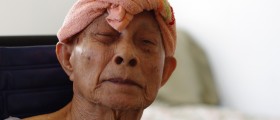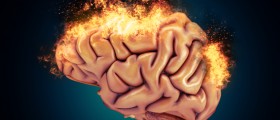
Sundowning, or sundowning syndrome is a condition associated with early stages of dementia and it is featured by confusion, agitation and irritability that occur in the evening hours. Onset of the symptoms is at sunset time, hence the name for the condition. Sundowning generally affects elderly people. The symptoms can be relieved with appropriate strategies and medications.
Sundowning syndrome is often seen in elderly patients with dementia such as Alzheimer’s disease. Symptoms of dementia such as irritable behavior, restlessness, disorientation and extreme agitation become worse in the late afternoon and in the evening. However, not all people with dementia exhibit symptoms of sundowning syndrome.
Causes of Sundowning Syndrome
The exact cause of sundowning syndrome is still a mystery. Some researchers believe that patients overwhelmed by accumulation of the sensory stimulation during the day experience sundowning symptoms in the evening. Others believe that the onset of symptoms is due to tiredness and stress. Another possible cause of sundowning may be hormonal imbalance that occurs at night. It is also believed that low lighting in the evening hours and inability to see well in the dark may cause anxiety and trigger the symptoms of sundowning syndrome.
Risk Factors for Sundowning SyndromeIncreased risk for sundowning have elderly people who are suffering from dementia or Alzheimer’s disease. It has been estimated that around 45% of Alzheimer’s disease patients suffer from sundowning. Severe cognitive impairment can also lead to sundowning syndrome in some people.
Symptoms of Sundowning SyndromeGenerally, symptoms of sundowning are the same as those of dementia but they are worse after sunset. A person with sundowning syndrome may see or hear things that are not real at night. Delusions of being watched or criticized are also present. In later stages of the condition, the patient becomes suspicious and displays disorientation, mood swings and insecurity. Paranoia, violence, depression, anger, fear, rapid mood changes, agitation, and irritability are also caused by sundowning syndrome.
Managing and Treatment for Sundowning Syndrome
Managing sundowning involves strategies that can minimize the triggers. The patient should be encouraged to take several naps during a day to avoid tiredness. Stimulating activities should be limited to morning hours. Restlessness can be reduced with a walk outdoors. Activities in patients surrounding as well as the noise should be limited to avoid stress. Routine should be established to help the patient feel safe. Also, rooms should be well lit to prevent confusion and hallucinations. Medications used in treatment of sundowning syndrome include anti-depressants for managing confusion, hypnotics and bezodiazepines to control agitation and for dealing with sleep disorders while cholinesterase inhibitors like Aricept can improve cognitive function.

















Your thoughts on this
Loading...